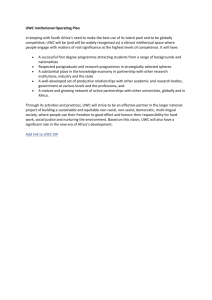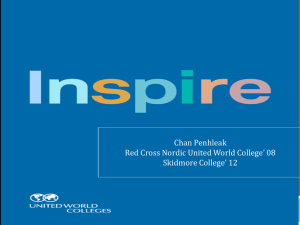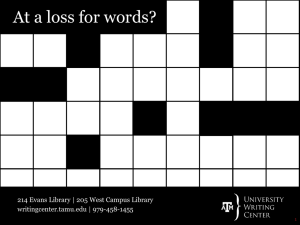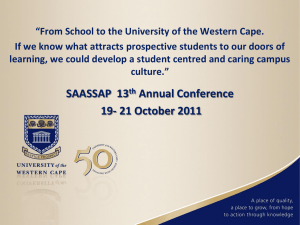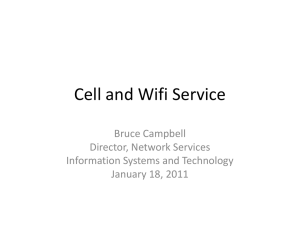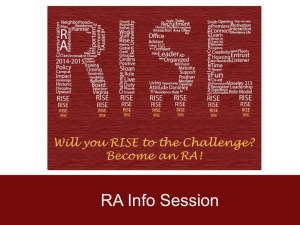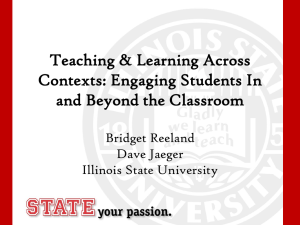A holistic approach to student services at UWC residences
advertisement
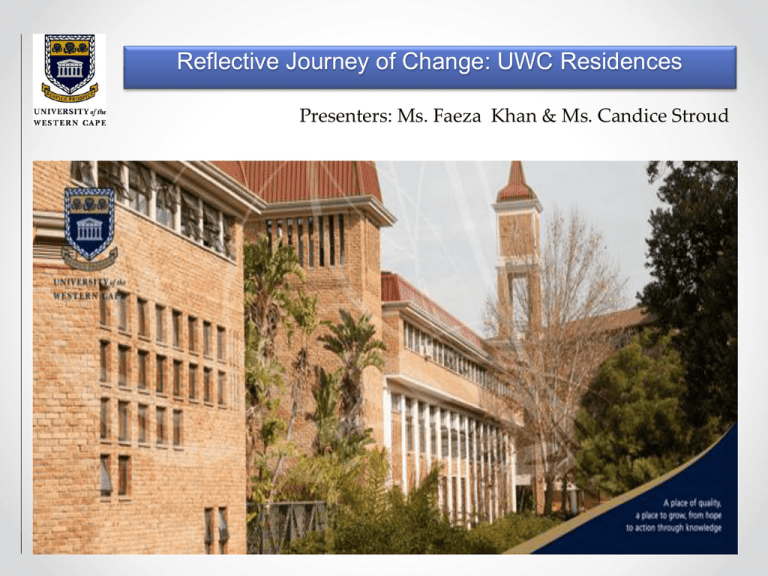
Reflective Journey of Change: UWC Residences Presenters: Ms. Faeza Khan & Ms. Candice Stroud “The secret of change is to focus all of your energy, not on fighting the old but on building the new” Socrates Setting the UWC context Dedicated to creating a sense of community in UWC Residences. • UWC started in 1960 as part of the Apartheid ‘s regime initiative to produce ethnic higher education. • It became known as the Western Cape’s University for “Coloured” persons. • The 1976’s Soweto uprising sparked the beginning of the Defiance campaign at UWC. • The university became the site of struggle : intellectually as well as in the trenches. • In 1980 the University was declared an Open University and admitted “Black students”. Setting the UWC context Dedicated to creating a sense of community in UWC Residences. • The 1990's were characterised on the one hand by a sense of rich achievement. • UWC was able to play an important role in the emergence of the new democratic order. • It provided opportunities for many people to prepare for a wide spectrum of higher-level careers, and played a leading part in policy research and formulation. • UWC takes pride in the fact that so many of its senior academics and alumni found themselves in public office at all levels, a number in the national cabinet. UWC Residences: Early days Dedicated to creating a sense of community in UWC Residences. • Residences were established in the 1970’s and its first residence was named after a political activist Cecil Esau • In keeping with the history of UWC surrounded by the political events, all the residences were named after political activists • In 1986 the cluster residences were built (total of 4 residences) as well as the first, first year residence namely Cassinga Residence) • UWC also sourced off campus accommodation for students • In the nineties students were highly politicized, there were ethnicity issues, mistrust between students, and students and staff. • Student demonstrations were common occurrences on the residences. Student would protest about dining halls, lack of hot water, maintenance, cleaning. UWC Residences: Early days (continued) Dedicated to creating a sense of community in UWC Residences. • There was probably not a residence that did not have a student selling merchandizes from his or her room. • Alcohol was freely available and some students would also offer it for sale on the residences. • Drugs were also a common challenge on the residences. • The focus of student development was largely on sports based programs and clean up campaigns • At the time each residence had their own system of dealing with disciplinary issues and sanctions • There were rules but these not strictly adhered to • Residences were managed by residence co-ordinators and porters were available to support students after hours UWC Impetus for Change! Dedicated to creating a sense of community in UWC Residences. • The dawning of the new democracy brought about a new energy and the possibilities for the future of UWC. • After a shaky start in the early days of democracy, the university withstood a perilous financial crisis, retrenchment of workers and the transformation of the higher education sector. • In 2009, the university developed the first Institutional Operating Plan which paved the way for transformation : the university moved from its reputation of being a previously disadvantage university to a business model. The IOP provided direction and focus to all the departments. • It defined the pathway to achieve academic excellence and develop graduates of quality. In addition to this it made provision for the university’s infrastructure and human resource change. • Residential Catering and Services(RCS) was required to align its operations with the new IOP. • Resident Management using Lewins Model of Change undertook a transformation process. UWC Impetus for change! Dedicated to creating a sense of community in UWC Residences. UWC Students • Total Resident students= 3600 • 11 Residences: 8 On campus & 3 Off campus • Majority of students dependant on Financial Aid • Students come from previously disadvantaged communities • Products of a poor education system • Students come from a community with a plethora of social ills Developing a ResLife Model Underpinning Theory: Ecological Model Theory UWC Living-Learning Communities • Focus on the holistic development of students across residences at UWC. It acknowledges that in order for students to learn, their socio-emotional, personal and economic needs must be met in order to create an environment conducive to optimal learning. • At UWC all efforts are made to ensure that residences are transformed into vibrant, learning spaces and that the approach to learning is novel and innovative. To this end, ResLife works with the RS Placement unit to ensure that floor plans in residences reflect the strategy of living and learning communities – it is a phased approach that grows each year. The process started in 2011. Building UWC Residence Life LivingLearning programming Student Leadership Cultural Life Residence Life Community Standards Wellness & Lifestyle Programming Psycho-social support Living-Learning Support • Tutorial Support • Learning Circles • Communities of Interest: 1. Law Jaw 2. Economics in Action 3. Big Bang Club 4. First years First 5. Great Big World 6. Earth Stewardship and Environmental justice club 7. African Pride • Mentorship with Development Officers Wellness & Lifestyle Programmes • First Year Adjustment Program • Peer Education Programme- RezLife Ambassadors • Life skills programmes • Wellness Programmes • Build partnerships and networking with internal and external stakeholders Cultural Life • Harnessing new talent • Choir Master • ResLife Café • Book Club • ResLife Café • Recruit new talent • Choir master • Book Club Student Leadership • House Committee Elections • Central House Committee Elections • Leadership Training • Support House Committee’s regarding programming Psycho-Social Support • Counselling • Skills Resources & Exchange Programme (SREP) • Funeral Support Community Standards Discussions • Based on the principles of restorative justice • Maintains and supports building a culture of human rights • Issues sanctions to students who break the rules to restore the balance of peace in the community Challenges Dedicated to creating a sense of community in UWC Residences. • Student Participation • Insufficient resources • Faculty Support • Student apathy Achievements Dedicated to creating a sense of community in UWC Residences. • • • • • • Structure and inclusion of students Student feedback mechanisms in place Good M& E system Sound Developmental programming Changing face of student leadership Establishment of living and learning communities Contact Details Dedicated to creating a sense of community in UWC Residences. • Faeza Khan • Living-Learning Coordinator • Email: fakhan@uwc.ac.za • Candice Stroud • Special Project Coordinator • Email: clstroud@uwc.ac.za
